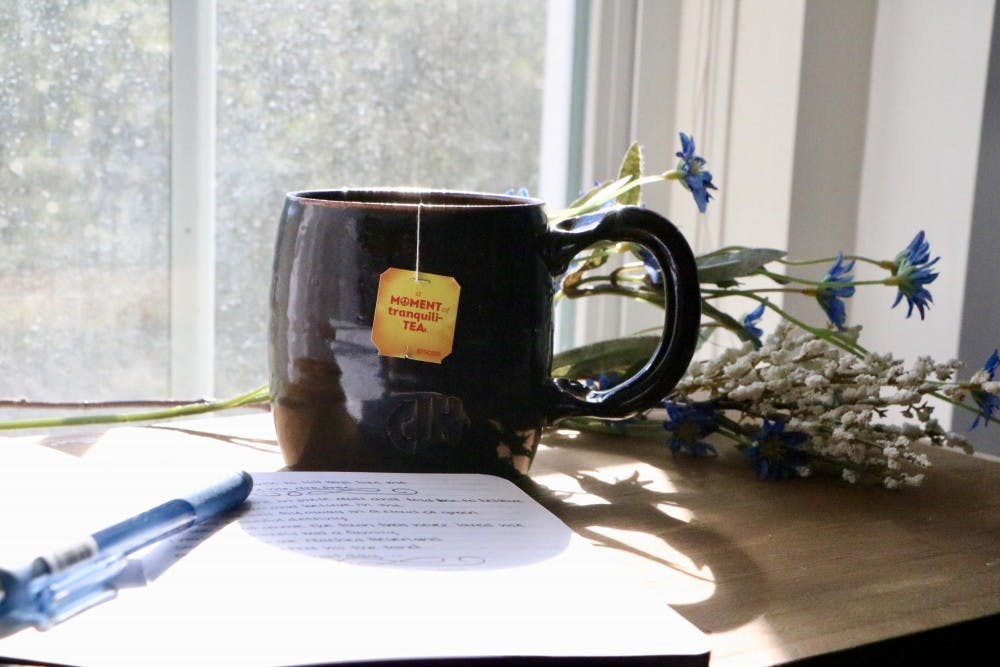With the turning of the seasons to the cooler months, the two major hot beverages, coffee and tea, will be popping up more and more around campus.
Coffee and tea seem to have a lot of similarities, but also a lot of differences.
When discussing coffee, Sarah Bennett, the owner and founder of Mama Mocha’s, notes the backstory of how coffee beans were discovered as a drink.
Allegedly, in Southwest Asia or East Africa, sources vary, a goat farmer named Kalbi saw his goats eating some berries off a plant. Later on the goats were jumping around and almost dancing. From there, they figured out it was the pit in the berry that was causing the goats to have this new-found energy. After that, they started processing the pit, or bean, and roasting it to make what we know as coffee.
On the subject of roasted coffee, Hope Nichols, head barista at The Bean Coffee Shop, said most roasts will be classified as light, medium or dark.
Contrary to popular belief, she points out that light roast will usually have more caffeine than the darker roast. Additionally, she notes the flavor of the coffee will depend on the acidity level of the roast.
Looking more closely at tea, there are five main types that Nichols and Bennett discuss: black, oolong, green, white and herbal.
Nichols explains that all tea comes from the same plant called Camellia Sinensis, except for herbal teas. Herbal teas use different kinds of plants, and because of this, herbal tea is the only one that does not naturally have caffeine.
Nichols notes that teas are distinguished from one another based on their harvesting process.
Bennett said the tea leaves go through a toasting-like process. For example, white tea is made with baby leaves that are lightly toasted. The intensity of the toast and the mature of leaves advances until it gets to the highest point, black tea.
The benefits from tea will differ depending on the tea. When it comes to green tea, Nichols comments it can help with ear, nose and throat problems. Bennett also adds that green tea is full of antioxidants. Regarding herbal teas, Bennett says most are anti-inflammatory, and some, such as chamomile, peppermint and ginger, can help with the digestive tract.
Nichols also notes turmeric can help boost the immune system.
Michael Greene, assistant professor of nutrition, cites that observational studies show, overall, both coffee and tea drinkers show a positive correlation with a risk reduction when it comes to some chronic diseases. However, he does mention to be wary of some the lurking variables, such as the type of person who drinks coffee, tea or both.
Both tea and coffee can have the benefit of caffeine. However, if not moderated, that can easily become a negative. Greene, Nichols and Bennett all agree too much caffeine can be a problem. Overall, they advise to be mindful about one’s daily caffeine intake.
Another negative that Greene mentions that tends to affect coffee more than tea is the additional calories that can be found in added ingredients like sugars and milk. Once again, he stresses the importance of moderation and being mindful of the impact the added components can have.
Overall, he explained neither coffee or tea is necessarily bad for you, as long as people are aware of their caffeine intake. Both drinks are good. It’s simply up to what you prefer.
“Try different methods. Try different ways. Try different drinks, and see what works best for you,” Nichols said.
Do you like this story? The Plainsman doesn't accept money from tuition or student fees, and we don't charge a subscription fee. But you can donate to support The Plainsman.

Abigail Murphy, senior in journalism with minors in history and women and gender studies, is the operations managing editor at The Auburn Plainsman.





